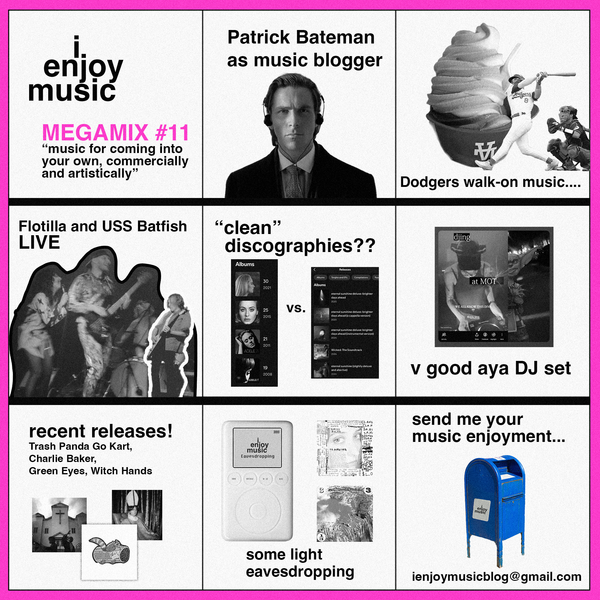don't stop blog rock: revisiting the music of DoM

At peak 'music blog' time — like 2010/2011 — you know, Hipster Runoff, Tiny Mix Tapes, Hype Machine, Pitchfork at full powers but not yet scooped up by Conde — I was in college, whittling away at my English degree. I had a Tumblr where I attempted a weak impression of the Internet Mollys who were doing so much groovy online writing, and I contributed bombastic music reviews to a now-defunct website called InYourSpeakers (an unpaid gig I found on Craigslist) but it never occurred to me to make a music blog of my own. Instead I was a lurker, creeping on the outskirts of everyone else's little content castles.
The strangest relic from this bloggy time is probably Pitchfork Reviews Reviews, a blog from the pseudonymous writer David Shapiro. As its title suggests, the blog was dedicated to reviewing Pitchfork reviews, leveling a metacritical gaze back onto those revered numerical rating slingers of yore. But Shapiro also recapped concerts and events, wrote about absurd happenings like meeting President Obama and telling him about Pitchfork, and eventually parlayed his outsider-observational oeuvre into legit journalism gigs and the publication of two autofictional novels, You're Not Much Use to Anyone and Supremacist.
Why am I thinking about Pitchfork Reviews Reviews? Well, as a new music blog, I keep thinking about my blog elders and the environment they were blogging within. Much has been made of Blog Rock, especially the hype cycles supported by the old mp3 blog formats, now largely washed away with the homogenization of social media's current algorithms. So I pulled up some old posts from PRR to see what was catching Shapiro's eye at this heady time, and see if it 'holds up' (Hipster Runoff scare quotes intended).
One dispatch from Pitchfork's #Offline festival in fall 2010 is very interesting. Shapiro watches the Worcester, Massachusetts band DoM play a set:
The lead singer has long stringy hair that hangs over most of his face, a nose ring, and he is wearing a small t-shirt and jeans that are ripped at the knees. He sings with a high, nasal, bratty voice that may or may not be a joking affect. I guess part of the fun of this band is trying to discern the total joke parts from the half-joke parts. DOM is maybe the most anticipated band at CMJ this year and they are often compared to the band Black Kids whose first EP received an 8.4 Best New Music right before CMJ in 2007. That band was an overnight sensation and played several packed and sweaty CMJ shows and then signed a contract with Capitol Records right after CMJ, and they were really popular until their record came out. The record wasn’t very good because major record labels handle indie rock bands about as well as cats fly planes, and then Pitchfork gave their record a 3.3 and the entire review was just this picture:

Later Shapiro has a quick and uneventful interview with DoM's lead singer, and then ends up talking to Pitchfork founder Ryan Schreiber:
I tell him that I talked to Dom from DOM but I didn’t really get a good interview because I guess I didn’t ask him the right questions, and I say that DOM sounded really good tonight, like so good that it is hard to believe that they are an impoverished indie band because their recordings and shows sound unusually crisp and professional to have been made by some disaffected 22-year-olds…
And he tells me that there is a rumor that DOM is on EMI, which is a major record label that would have the money to finance their really professional recordings and shows, and I ask him why he thinks that and he says that they retweeted someone who said that there is a rumor that they are on EMI. It seems like the truth could go either way. Ryan notes that the DOM guitarist was really shredding on stage tonight and he demonstrates how the guitarist was shredding with an air guitar, and as he is playing his air guitar he looks up and closes his eyes and bites his lip. I tell him that i just saw the guitarist leave with a photographer. Then, to explain their expensive-sounding production, he says, “Well they’re from Massachusetts, maybe they’re just rich kids,” and he laughs when he says “rich kids” because he is mostly kidding.
In these few paragraphs alone, I feel like the blog hype cycle is fairly clear. You can feel the softly feverish energy of this time radiating off the coverage. This was at a time when a band could really live and die by the Pitchfork review (the Travis Morrison 0.0 comes to mind), and when it was certainly a bigger deal for indie bands to sign to majors (now Phoebe Bridgers is on an indie as a solo artist and on a major as part of boygenius and no one seems to care?) and when a lot more loose money seemed to be flowing in the general music zone (e.g. Pitchfork throwing a non-Pitchfork Fest festival with a hashtag for a title), and when hipster aesthetics we take for granted now were being perfected in real time.
If you look at what DoM was doing for press around this moment of buzz, their appearances were studiously rowdy; in one 2011 ABC News feature, they chug beer, set off fireworks, and say they will never record a full-length album because "it's a singles market," which ended up being remarkably prescient. Because they were fond of cheeky fabulism in interviews (like claiming their song "Bochicha" was played at Worcester Sharks hockey games), the media treated the band with a skeptical, "look at this fucking hipster" attitude by the media, even as lead singer Dominic Cournoyer consistently alluded in Q&As to a troubled childhood spent in juvenile halls and foster homes. Giving good quote fed the hype machine, and a decade after the Strokes broke big, there was clearly still a market demand for cute, loose-lipped, lawless dudes playing rock music, even if the sonic trends were moving away from gritty rock and toward dreamier, poppier, sunnier, sillier sounds.
So what happened to the band? At the time of the #Offline Fest, they had one 8.0 rating in the can for their first EP, Sun Bronzed Greek Gods, and then a year later in 2011 they received another 8.0 for another EP, Family of Love (which indeed came out on then-EMI imprint Astralwerks, as Pitchfork Reviews Reviews hypothesized)...and then that was simply it for a while. Cournoyer put out some electronic music under the name Kiss 1o8, teased a new album called Sweet & Sour that never materialized (Stereogum: "Sweet & Sour is out sometime on some label, presumably"), then he dipped out again. He eventually did an interview with Noisey in 2017 and said that DoM's major label moves were marred by drug abuse and general misery: "I went from playing the Sydney Opera House...to hearing the sound of my own name said out loud feeling like a curse. Times just got really dark." Since then, he's released a smattering of singles, including 2017's "Gud Tymes (Good Times)" and last year's "Vanilla," both of which took a little bit of effort to find on major streaming services. It might just be because the brevity of "DoM" punishes its search engine optimization in our current, blog-unfriendly internet world. Right now, DoM's Apple Music page is oddly mashed up with a Brazilian hip hop artist named Dom.
It's interesting to watch the way DoM get blogged about over time, specifically how they get intro'd in posts:
Worcester, Massachussets pop-rock trio Dom
Synthesized Worcester pop trio (and sometimes quintet?) Dom
young Worcester, MA fringe-cultural ambassador DOM
the MGMT-lovin’ Brooklyn-via-Worcester psych-poppers DOM
the ratchet Worcester, Massachusetts psych-pop band DOM
I guess I'm just thinking about how strange it is, to 'write' about a band 'online.' The specific era DoM came up in made their success possible — writer Liz Pelly, for example, said her first interaction with DoM was when "a song called 'Jesus' appeared in my Gmail inbox with little to no context, just a note from some dude named Dom in Western Mass asking if I’d play the song on my college radio show" — but it also flattened them into blog fodder, you know? It's possible I'm just way too sensitive for this aspect of the game, but as Ms. Joan Didion (or as I call her, Joanie Didz) once wrote, "Writers are always selling somebody out," and every time I write about a band or an artist, I wonder if the act of doing so inadvertently flattens them in the same way.
We're so attached to narrative and categorization, in genres and trends and What It All Means, and so a band like DoM is an intriguing and irreverent newcomer, then "maybe the most anticipated band at CMJ this year," then an unpredictable, label-less group in a state of suspended animation, then a "where are they now?" enigma. (When covering the release of "Gud Times (Good Times)" in 2017, Pitchfork offered a terse rationale for the band's activity: "Given their propensity for recklessness, it’s not entirely surprising that they disappeared.") And years later, we can follow these narratives and categorizations every step of the way from excitement to inertia, as long as these websites stay live (or as long as the Wayback Machine can scrape old screenshots). Blogs, in comparison to legacy publications behind paywalls or DIY zines lost to time, give us an accessible digital paper trail. It's possible to read about the bands who went from blog stars to real stars, the bands who didn't quite crack the mainstream but hung around long enough enough to get booked for Just Like Heaven, and the bands like DoM.
So let me pull back from the human interest zone a second and just listen to the music. I understand why these tunes excited the bloggers of yesteryear. The EPs have an alluringly sweet sound and some truly excellent hooks in the choruses ("It's so sexy / Living in America") that make it clear how DoM must have stood out in the sea of bands tilting at indie fame at this time. Cournoyer's voice is incongruously childlike, the guitars are fuzzier than bumblebees, the synths are radiant, the drums are active but softened, with a "heard-from-another-room" effect that was ahead of its time. It's fitting DoM put out their EPs at the dawn of the eventual blog-killer Instagram, because everything has a dreamy filter on it. Which was a sonic choice that made total sense in context. Reverb ruled everything around the early 2010s, just listen to the extremely of-its-time debut album by Best Coast. If anything, I wish there were later DoM albums to see how they surfed the changing sonic trend waves over the years.
But Cournoyer is still around and still cooking as a solo artist. That Noisey interview referenced his ghostwriting and session work with hip hop artists and bands, which I'm very curious about. And just a few weeks ago, a remix to "Vanilla" by a producer called Fast Times appeared online. It's a bibbety bobbity BOP.
It's taken a while to write this piece. When I first started on it, I thought I was writing about a band that was the subject of a singular post from a defunct Tumblr, a blog era one-off without any contemporary 'output' to speak of. I was very wrong about that! And I think there's something amazing about the resilience of Cournoyer's music, which has now officially outlasted the era of peak blog reductionism. Though I would say the pivot of music criticism from written blogs to video platforms like YouTube and TikTok has its own problems with oversimplification — I'm seeing new artists resorting to placing their work into incredibly specific genre boxes and leaning on "if you're a fan of [established band], you'll be a fan of me" messaging in order to get traction, and that feels just as inauspicious. Plus ça change...
In the end I'm writing about DoM here because I think Dominic Cournoyer is a great and clever and true musician, and I want to celebrate his talent outside of the hype cycle, on this blog, which is itself trying to resist the internet attention economy's consolidation to one small screen, one long feed, one constant uninterrupted scroll with nary a hyperlink in sight. It feels important to me to do that. I liked listening to the DoM EPs so many years after they made a splash in the blogosphere. I think "Vanilla" is fresh, bouncy and fun. There's also something very sticky about the euphoric maximalism of the Kiss 1o8 music — it sounds like it understood what 'internet music' (h/t No Bells) was, long before everyone else figured it out. It is amusing that the minimum Bandcamp album price for Kiss 1o8's hyperfantasy xl is set at $200, even though the individual songs are a dollar apiece. I guess it's like the pricing of a rare book.




